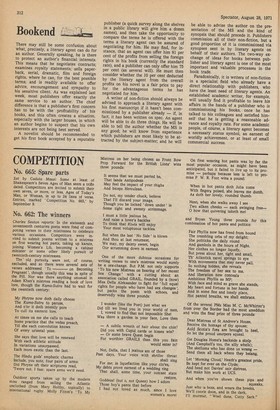Bookend . /....2.;1=4
There may still be some confusion about what, precisely, a literary agent can do for an author. Generally speaking, he is there to protect an author's financial interests. This means that he negotiates contracts; examines royalty statements; sells paperback, serial, dramatic, film and foreign rights, where he can, for the best possible terms; and is readily available to offer advice, encouragement and sympathy to his sensitive client. As was explained last week, most publishers offer exactly the same service to an author. The chief difference is that a publisher's first concern has to be with the profitability of his books, and this often creates a situation, especially with the larger houses, in which an author begins to suspect that his own interests are not being best served.
A novelist should be recommended to get his first book accepted by a reputable publisher (a quick survey along the shelves in a public library will give him a dozen names), and then take the opportunity to compare the terms he is offered with the terms a literary agent can be assured of negotiating for him. He may find, for instance, that an agent can offer him 81 per cent of the profits from selling the foreign rights in his book (currently the standard rate), and a publisher can only offer him 75 per cent (as several will). He must then consider whether the 10 per cent deducted by the literary agent from the overall profits on his novel is a fair price to pay for the advantageous terms he has negotiated for him.
A writer of non-fiction should always be advised to approach a literary agent with his first manuscript if it hasn't been commissioned by a publisher already — if, in fact, it has been written on spec. An agent will be able to do three things. He will be able to tell the author whether the MS is any good; he will know from experience which publishers are most likely to be attracted by the subject-matter; and he will be able to advise the author on the presentation of the MS and the kind of synopsis that should precede it. Publishers commission all of their non-fiction, but 'a good proportion of it is commissioned via synopses sent in by literary agents on behalf of their authors. The two-way exchange of ideas for books between publisher and literary agent is one of the most important and valuable processes in the book trade.
Paradoxically, it is writers of non-fiction in a specialist field who already have a direct relationship with publishers, who have the least need of literary agents. An established academic writer, for example, will usually find it profitable to leave his affairs in the hands of a publisher who is commissioning his books, once he has talked to his colleagues and satisfied himself that he is getting a reasonable advance and royalty rate. For some academic people, of course, a literary agent becomes a necessary status symbol, an earnest of worldly achievement, or at least of small commercial success.


































 Previous page
Previous page